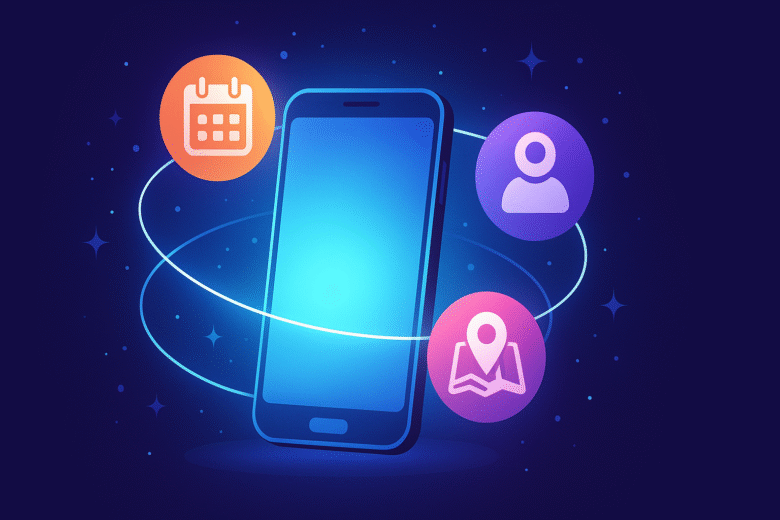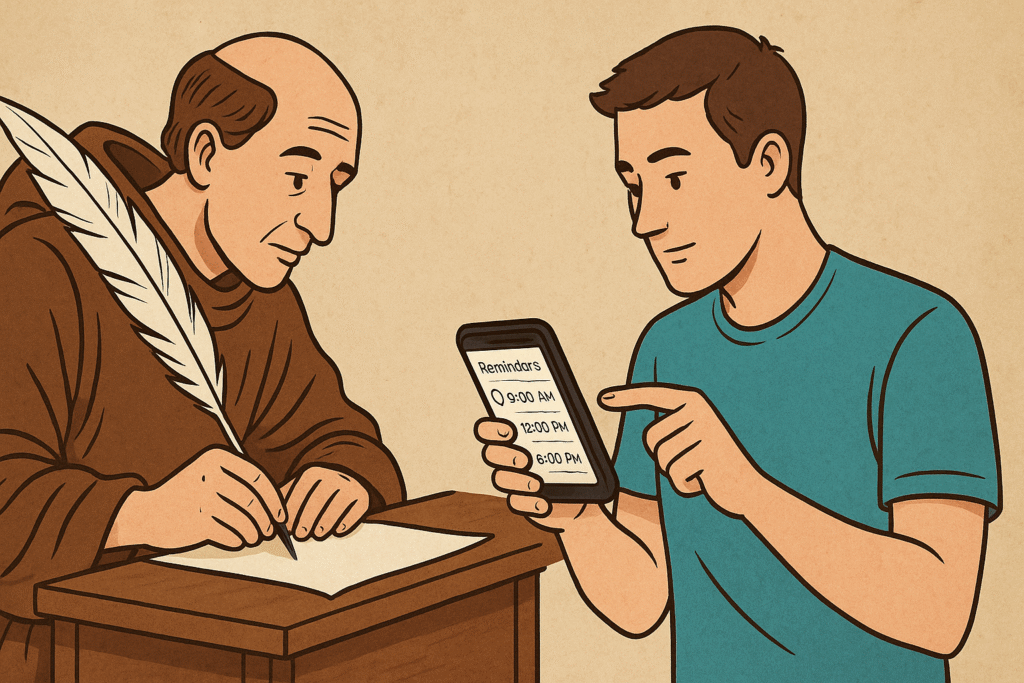Fun Fact: The average person checks their phone about 96 times a day—that’s once every 10 minutes.
Picture starting your day with no clue what day it is. Or forgetting your best friend’s birthday. Or walking into a supermarket without a clue what to buy. These things don’t happen anymore—not because our memories have improved, but because we’ve outsourced them. To our phones.
This quiet little handoff is called cognitive offloading—when your brain decides, “Why should I remember this, when the phone can do it for me?” And the more we lean on our devices, the less mental heavy lifting we do ourselves. What once required neurons now requires notifications.
Let’s unpack what’s going on—and whether our brains are just being efficient, or dangerously lazy.
Your Brain’s Shortcut System
Cognitive offloading is exactly what it sounds like: handing off thinking tasks to external tools. Calendars, GPS (Global Positioning System), calculators, shopping lists, reminders, Google searches—all count.
And this isn’t new.
Ancient humans etched notches into bones to count. We used knotted ropes, tally sticks, and chalkboards to track things. In other words, humans have always relied on external tools to reduce cognitive load. The difference today? We carry a supercomputer in our pockets that remembers everything for us—except maybe why we walked into a room.
Neuroscientists suggest that offloading is actually an evolutionary strategy. Brains are energy-hungry. Why burn mental calories remembering phone numbers when they’re stored in contacts? Why memorize the route to a restaurant when GPS exists?
But there’s a catch.
The Convenience Trap
Our smartphones have become the Swiss Army knives of memory. They tell us when to wake up, where to go, who to call, what to buy, and how to feel (scroll long enough on Instagram and your mood will shift).
Yet, researchers warn that this mental outsourcing comes at a cost. According to a 2018 study from the University of Texas, offloading can hinder long-term memory encoding. When we don’t engage in recall, our brain’s memory muscles weaken.
Dr. Benjamin Storm, a psychologist at the University of California, Santa Cruz, puts it bluntly: “If you don’t use your memory, you lose it.”
A classic example? Phone numbers. Ask yourself: How many phone numbers do you know by heart today, compared to 10 years ago?
Offloading in Everyday Life
Case 1: Navigation
Before GPS, you had to mentally map your route—or physically look at one. Now, with turn-by-turn navigation, people often reach destinations without knowing how they got there. In one UK study, London taxi drivers who passed the city’s rigorous “Knowledge Test” showed greater hippocampal development (that’s the part of the brain associated with spatial memory). Constant GPS use? Not so much.
Case 2: Search Engines
Ever Googled something simple like the spelling of a word you knew how to spell in school? That’s offloading. A study published in Science found that when people knew they could look something up later, they were significantly less likely to remember it. Our brains have adopted what some call “Google Knowing”—not remembering the fact, but where to find it.
Case 3: Task Management
To-do lists, alarms, and calendar apps are now essential. We use them to track meetings, water breaks, even when to take a walk. But psychologists note that writing things down externally bypasses the brain’s executive functions—planning, decision-making, and attention management.
Digital Crutches or Cognitive Freedom?
So, is this all bad?
Not necessarily. In fact, some argue it’s a strategic use of brainpower. Offloading frees cognitive space for higher-order thinking: problem-solving, creativity, and emotional regulation. Why waste effort remembering a 12-digit password when you can use that energy to write a poem?
But the key word is balance.
If you always use a calculator, you lose number sense. If you always rely on GPS, you never build internal maps. If you never try to recall, your memory starts to atrophy.
Think of your brain like a muscle. It’s fine to rest it—but not all the time.
The Memory Renaissance
Interestingly, some schools and tech critics are pushing back. There’s a renewed interest in memory training. Apps like Lumosity (a brain training platform by Lumos Labs) and Peak promise to sharpen memory. Meanwhile, productivity influencers are talking about “deep work,” “digital minimalism,” and “second brains” (like using the app Notion as an external but structured memory).
Even paper is making a comeback. Bullet journaling, physical planners, and sticky notes—tools that demand active engagement—are trending among young professionals burned out by digital overload.
What Can You Do About It?
Start by asking: What do I want my brain to do more of?
Here are a few gentle shifts:
- Try remembering phone numbers again—start with one.
- Use GPS for planning, not following blindly.
- Resist Googling every question—sit with it first.
- Write down your grocery list—and try to recall it before peeking.
- Commit a poem, a speech, or even a simple joke to memory.
Treat these like gym reps for your mind.
The Psychological Trade-Off
There’s also an emotional angle. Relying on your phone constantly can make you anxious when it’s not around—a phenomenon known as nomophobia (no-mobile-phone phobia). We aren’t just offloading memory—we’re offloading confidence. The less we rely on ourselves, the less we trust ourselves.
Is it convenience or dependency?
Offloading lets us skip friction, but friction is often where growth lives. Maybe getting lost once in a while isn’t such a bad thing.
Conclusion: Outsource Wisely, Remember Deeply
Cognitive offloading is not a villain. It’s a tool. As with any tool, its value depends on how you choose to use it. Your phone can be a brilliant assistant—but it shouldn’t become your brain.
In a world overflowing with convenience, choosing to remember, to struggle a little, to engage your mind—is an act of rebellion.
And maybe that’s the most human thing you can do today.
Author’s Note
This blog was written with two tabs open, one cup of tea, and zero use of a calculator. Okay, maybe once.
G.C., Ecosociosphere contributor.
References and Further Reading
- Storm, B. C., Stone, S. M., & Benjamin, A. S. (2016). Using the Internet to Access Information Inhibits Subsequent Memory for the Information. https://journals.sagepub.com/doi/10.1177/0956797615623799
- Ward, A. F. (2013). The brain in your pocket: Evidence that smartphones are used to offload thinking. https://journals.sagepub.com/doi/abs/10.1177/0956797613484043
- “The Google Effect,” Science, July 2011: https://www.science.org/doi/10.1126/science.1207745
- https://www.fox13seattle.com/news/americans-check-their-smartphones-96-times-a-day-survey-says
- https://blog.codinghorror.com/the-mainstreaming-of-gps
- https://vocal.media/futurism/the-evolution-of-smartphones-from-communication-devices-to-digital-swiss-army-knives
- https://www.apa.org/monitor/julaug03/remembering





